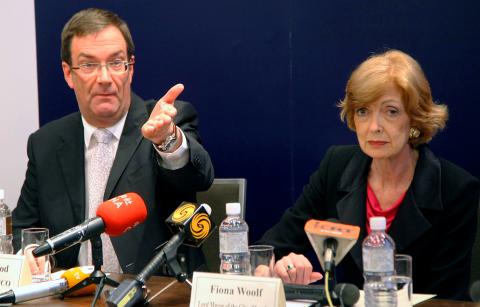Taiwan has the potential to develop into a large offshore yuan business center like Singapore and Hong Kong if the government further loosens regulations on financial products and services, Lord Mayor of London Fiona Woolf said in Taipei yesterday.
“You will need to see more liberation in the way financial products and services are regulated in Taiwan,” Woolf told a press conference.
“It’s very unusual for regulators to approve licenses required to sell new financial products and services after evaluating them in details,” Woolf said, adding that local and international banks tend to miss the best time to sell new products and services because of how long it takes them to get approval in Taiwan.

Photo: CNA
Woolf visited Taipei three years ago with then-lord mayor David Wootton. Over the past two days in Taipei, she had met with many local business and political leaders — including President Ma Ying-jou (馬英九), Financial Supervisory Commission Chairman William Tseng (曾銘宗) and central bank Governor Perng Fai-nan (彭淮南) — to promote opportunities in financial services between the UK and Taiwan.
Citing the “enormous” growth of businesses between Taiwan and China over the past two years, Woolf said she was “excited about the opportunities for Taiwan and London to work together on renminbi [yuan] business.”
However, because of strict regulatory constraints, Taiwan has not developed “its capability as an offshore renminbi business center with really good financial products and services,
she said.
“The regulatory regime is very constrained at the moment, particularly for onshore banks and offshore banks,” Woolf said.
“I will suggest the Taiwanese government’s first step is to liberalize the financial service sector and then to phase out the difference between onshore and offshore banks, which actually does not exist in the global market, or the money would go to Hong Kong and Singapore,” Woolf added.
According to the central bank’s latest report, Taiwan’s yuan deposits amounted to 182.6 billion yuan (US$230.2 billion) as of the end of last year, compared with 10 trillion yuan in Hong Kong.
The Lord Mayor of London is an apolitical and unpaid position and the legal title of the head of the City of London Corp.
Elected in November, Woolf is the second woman to hold the post since 1189. Her major duties include promoting London’s business environment and expertise.
Additional reporting by CNA

SEMICONDUCTORS: The German laser and plasma generator company will expand its local services as its specialized offerings support Taiwan’s semiconductor industries Trumpf SE + Co KG, a global leader in supplying laser technology and plasma generators used in chip production, is expanding its investments in Taiwan in an effort to deeply integrate into the global semiconductor supply chain in the pursuit of growth. The company, headquartered in Ditzingen, Germany, has invested significantly in a newly inaugurated regional technical center for plasma generators in Taoyuan, its latest expansion in Taiwan after being engaged in various industries for more than 25 years. The center, the first of its kind Trumpf built outside Germany, aims to serve customers from Taiwan, Japan, Southeast Asia and South Korea,

Gasoline and diesel prices at domestic fuel stations are to fall NT$0.2 per liter this week, down for a second consecutive week, CPC Corp, Taiwan (台灣中油) and Formosa Petrochemical Corp (台塑石化) announced yesterday. Effective today, gasoline prices at CPC and Formosa stations are to drop to NT$26.4, NT$27.9 and NT$29.9 per liter for 92, 95 and 98-octane unleaded gasoline respectively, the companies said in separate statements. The price of premium diesel is to fall to NT$24.8 per liter at CPC stations and NT$24.6 at Formosa pumps, they said. The price adjustments came even as international crude oil prices rose last week, as traders

Taiwan Semiconductor Manufacturing Co (TSMC, 台積電), which supplies advanced chips to Nvidia Corp and Apple Inc, yesterday reported NT$1.046 trillion (US$33.1 billion) in revenue for last quarter, driven by constantly strong demand for artificial intelligence (AI) chips, falling in the upper end of its forecast. Based on TSMC’s financial guidance, revenue would expand about 22 percent sequentially to the range from US$32.2 billion to US$33.4 billion during the final quarter of 2024, it told investors in October last year. Last year in total, revenue jumped 31.61 percent to NT$3.81 trillion, compared with NT$2.89 trillion generated in the year before, according to

PRECEDENTED TIMES: In news that surely does not shock, AI and tech exports drove a banner for exports last year as Taiwan’s economic growth experienced a flood tide Taiwan’s exports delivered a blockbuster finish to last year with last month’s shipments rising at the second-highest pace on record as demand for artificial intelligence (AI) hardware and advanced computing remained strong, the Ministry of Finance said yesterday. Exports surged 43.4 percent from a year earlier to US$62.48 billion last month, extending growth to 26 consecutive months. Imports climbed 14.9 percent to US$43.04 billion, the second-highest monthly level historically, resulting in a trade surplus of US$19.43 billion — more than double that of the year before. Department of Statistics Director-General Beatrice Tsai (蔡美娜) described the performance as “surprisingly outstanding,” forecasting export growth